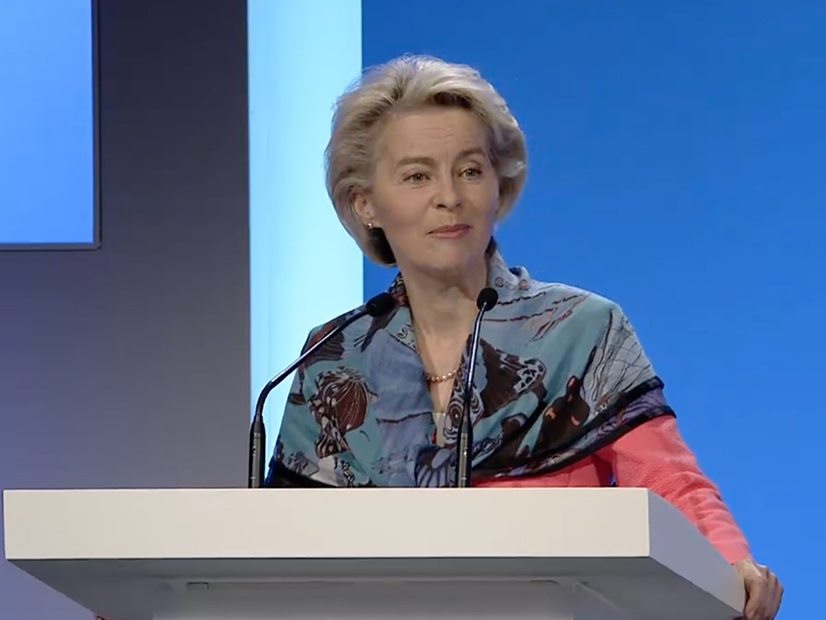The oil and gas industries in the U.S., Canada and the European Union can expect a plethora of proposals for new rules designed to sharply cut methane emissions from wellheads, pipelines and storage depots by 2030.
During the U.N. Climate Change Conference (COP26) in Glasgow on Tuesday, President Biden, Canadian Prime Minister Justin Trudeau and European Commission President Ursula von der Leyen pledged they would lead a global methane reduction effort that began in September and is now endorsed by 105 nations.
Leaders from many of those nations spoke in support of the initiative, including those from Argentina, South Korea, Vietnam, Colombia, Libya, Ecuador and the Republic of the Congo.
Biden, Trudeau and von der Leyen made it clear that the effort would immediately require new regulations — which Republican lawmakers in the U.S. blasted within hours.
Noting that methane is 80 times more potent a greenhouse gas than carbon dioxide, von der Leyen explained the rush: “We need big structural changes to reach 2050 climate neutrality, but we cannot wait for 2050. We have to cut emissions fast. And methane is one of the gases we can cut fast. Doing that will immediately slow down climate change,” she said, adding that the EU would propose new rules next month.
Biden added that without methane leak reductions, keeping the lid on the average global temperature increase by 2050 may not even be possible.
“What we’re going to do between now and 2030 is going to impact significantly on whether we’ll be able to meet our longer-term commitment,” he said. “And one of the most important things we can do in this decisive decade … is reduce our methane emissions as quickly as possible.”
Trudeau pledged his government would create regulations to slash methane leaks by 75% from the oil and gas industry alone.
“There’s no achievable pathway to limit global warming to 1.5 degrees Celsius without deep cuts to methane over the next decade,” he said. “As Ursula and Joe and others have pointed out, methane has six times the warming power of carbon dioxide over a 20-year period.”
Fatih Birol, a Turkish economist and executive director of the International Energy Agency, put immediate methane reduction in a dramatic context: “If we fulfill this pledge over the next 10 years, the impact is [the same as] switching off all the cars of the world, all the trucks of the world, all the planes of the world, all the ships of the world. This is historic.”
Biden said an all-out effort to combat methane leakage would be a job creator.
“It’s going to boost our economies, saving companies money by reducing methane leaks, capturing methane, turning it into new revenue streams, as well as creating good-paying union jobs for our workers,” he said. “And we’re talking about jobs to manufacturing new technologies for methane detection. Jobs for union pipe fitters and welders to go out and cap abandoned oil wells and plug leaking pipelines. …
“We’re proposing two new rules: one through our Environmental Protection Agency that’s going to reduce methane losses from new and existing oil and gas pipelines, and one through the Department of Transportation to reduce wasteful and potentially dangerous leaks from natural gas pipelines,” the president said.
EPA had already released a statement announcing proposed new rules under the Clean Air Act, requesting comments on further strengthening emission controls on oil and gas operations and noting that in the U.S., the “the oil and natural gas industry is the largest industrial source of methane emissions, emitting more methane than the total emissions of all greenhouse gases from 164 countries combined.”
Before noon, Republican congressional leaders blasted the proposal with a statement about winter heating bills. It did not mention climate change.
“We are concerned this new regulatory proposal, in addition to the natural gas tax proposed in the Democrats’ tax-and-spending spree, is another attack on American energy. America is leading the world in emissions reductions, and we have shown that innovation — not regulation — is the key to making energy cleaner and more affordable,” it said.
Later in the day during a press conference with American reporters, Biden took questions about the political challenge the administration will face to win congressional approval of some of his pledged commitments.
“How do you convince Republicans and even some Democrats to get behind more spending, if they look at this conference and say, ‘China isn’t meeting these global goals. Russia doesn’t intend to meet these global goals. India doesn’t plan to. Why shouldn’t we wait?’” asked one reporter.
“Because we want to be able to breathe, and we want to lead the world,” Biden replied. “The single most important thing that’s gotten the attention of the world is climate. Everywhere. From Iceland to Australia. It just is a gigantic issue.” China and Russia have “walked away. How do you do that and claim to be able to have any leadership now?”



